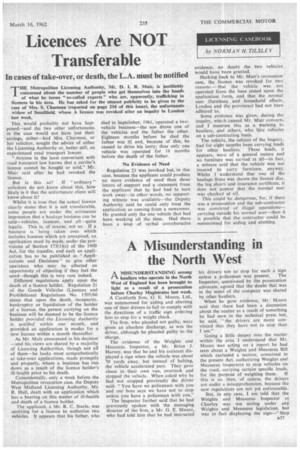Licences Are NOT Transferable
Page 71

If you've noticed an error in this article please click here to report it so we can fix it.
In cases of take-over, or death, the L.A. must be notified
THE Metropolitan Licensing Authority, Mr. D. I. R. Muir, is justifiably concerned about the number of people who get themselves into the hands of what he terms "so-called experts" who are, apparently, trafficking in licences in his area. He has asked for the utmost publicity to be given to the case of Mrs. S. Charman (reported on page 216 of this issue), the unfortunate widow of Smallfield, whose A licence was revoked after an inquiry in London last week.
This would probably not have happened—and the two other unfortunates in the case would not have lost their savings, either—had Mrs. Charman, or her solicitor, sought the advice of either the Licensing Authority or, better still, an experienced road transport lawyer.
"Anyone in the least conversant with road transport law knows that a carrier's licence cannot be bought or sold," Mr. Muir said after he had revoked the licence.
But is this so? If " ordinary" solicitors do not know about this, how likely is it that the unfortunate client will know about it?
Whilst it is true that the actual licence clearly states that it is not transferable, some people are under the erroneous impression that a haulaize business can be sold—vehicles, licences. and all—quite legally. This is, of course, not so. If a business is being taken over which includes licences which are unexpired, an application must bc made, under the provisions of Section 173(I)(c) of the 1960 Act, for the transfer, and such an application has to be published in "Applications and Decisions" to give other operators who may he affected an opportunity of objecting if they feel the need—though this is very rare indeed.
Different regulations apply upon the death of a licence holder. Regulation 21 of the Goods Vehicles (Licences and Prohibitions) Regulations No. 1505/60 states that upon the death, incapacity, bankruptcy or liquidation of the holder of a licence, the person carrying on the business will be deemed to be the licence holder provided the Licensing Authority is notified within one month, and provided an application is madee for a new licence within a month thereafter.
As Mr. Muir announced in his decision —and his views are shared by a majority of Licensing Authorities, though not all of them—he looks most sympathetically at take-over applications, made promptly and properly, where a business has run down as a result of the licence holder's ill-health prior to his death.
Coincidentally, only a week before the Metropolitan revocation case, the Deputy West Midland Licensing Authority, Mr. R. Hall, dealt with an application which has a bearing on this matter of ill-health and death of a licence holder.
The applicant, a Mr. R. C. Steele, was applying for a licence to authorize two vehicles. It appears that his father, who
died in Septimber, 1961, operated a twovehicle business—the son drove one of the vehicles and the father the other. Eighteen months before he died the father was ill and, because of this, he ceased to drive his lorry; thus only one vehicle was operated for 18 months before the death of the father.
No Evidence of Need Regulation 21 was invoked but, in this case, because the applicant could produce no more evidence of need than three letters of support and a statement from the applicant that he had had to turn work away—in other words, no supporting witness was available—the Deputy Authority said he could only treat the application as coming from a newcomer. He granted only the one vehicle that had been working all the time. Had there been a wisp of verbal corroborative evidence, no doubt the two vehicle's would, have been granted.
Harking back to Mr. Muir's revocation case, the licence was revoked for two . reasons — that the vehicle was not operated from the base stated upon the application form, and that the normal user (furniture and household effects,_ London and the provinces) had not been adhered to.
Some evidence was given, during the inquiry, which caused Mr. Muir concern. and I mention this as a warning to hauliers, and others, who hire vehicles on a sub-contracting basis.
The vehicle, the subject of the Inquiry, had for eight months been carrying loads for other hauliers. These loads, it appears, were of a general nature and no furniture was carried at all—in fact, a witness said that the vehicle was not insured to carry furniture, anyway. Whilst I understand that one of the haulage firms was shown the licence disc, the log sheets and insurance certificate, it does not appear that the normal user was checked at all This could be dangerous, for, if there was a prosecution and the sub-contractor was convicted of illegal operations— carrying outside his normal user—then it is possible that the contractor could be summonsed for aiding and abetting.




















































































































